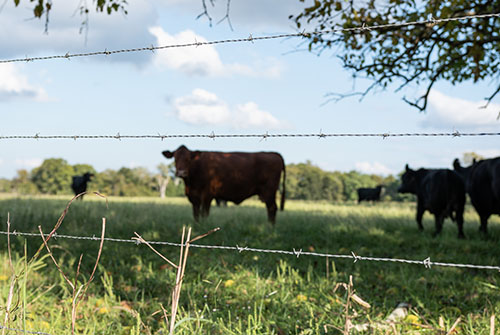Choosing the Best Fencing for your Livestock
Jun 14, 2021

Fencing is not a “one-size-fits-all” deal. Horses, cattle, goats, and sheep have distinct demeanors and tendencies that require different needs to be addressed. For example, the best fence option for your flighty horse might not be the best option for your escape-artist goat. Therefore, it’s important to keep in mind your animals’ natural behavior when planning your livestock fencing.
Here are a few fencing guidelines to consider that will help you to create a safe and secure environment for each species:
Horses
The most important factor to consider with horses is their flight instinct. For this reason, visibility is a must. Although barbed wire or high-tensile single-wire fence might appear cheap and effective, these types of fences should not be used. They are too hard for the horse to see and could result in serious injury if the horse were to run through and get tangled. Wood post and board fences are generally the best choice, but the high cost and maintenance might rule this option out for some. Wide-strand, electrified poly tape fencing is equally effective, is easier to maintain, and is more portable.
Cattle
Because cattle tend to be more durable and less prone to panicking than horses, fencing tends to focus more on economic benefits to the farmer. Many cattle operations have huge pastures for grazing, which means fencing needs to be relatively cheap. For this reason, barbed wire or high-tensile wire are often the fence materials of choice. Make sure your cattle are up-to-date on their tetanus boosters in the event of a skin laceration.
Goats and Sheep
Goats are arguably the hardest animals to contain. Due to their small size, wood post and board or PVC fencing will not work. Woven mesh fencing is most commonly used with both sheep and goats. Keep in mind that the weave pattern should be small enough to prevent any heads from pushing through and getting stuck. A strand of electrified wire can also be run down the interior of the fence for further security.
A little bit of planning and research will go a long way when it comes to your long-term fencing investment. Don’t cut corners and risk your livestock getting hurt or being able to escape. For fencing materials of all types, visit your local Co-op. Find the nearest location here.
For more content like this, check out the latest issue of the Cooperator.
Here are a few fencing guidelines to consider that will help you to create a safe and secure environment for each species:
Horses
The most important factor to consider with horses is their flight instinct. For this reason, visibility is a must. Although barbed wire or high-tensile single-wire fence might appear cheap and effective, these types of fences should not be used. They are too hard for the horse to see and could result in serious injury if the horse were to run through and get tangled. Wood post and board fences are generally the best choice, but the high cost and maintenance might rule this option out for some. Wide-strand, electrified poly tape fencing is equally effective, is easier to maintain, and is more portable.
Cattle
Because cattle tend to be more durable and less prone to panicking than horses, fencing tends to focus more on economic benefits to the farmer. Many cattle operations have huge pastures for grazing, which means fencing needs to be relatively cheap. For this reason, barbed wire or high-tensile wire are often the fence materials of choice. Make sure your cattle are up-to-date on their tetanus boosters in the event of a skin laceration.
Goats and Sheep
Goats are arguably the hardest animals to contain. Due to their small size, wood post and board or PVC fencing will not work. Woven mesh fencing is most commonly used with both sheep and goats. Keep in mind that the weave pattern should be small enough to prevent any heads from pushing through and getting stuck. A strand of electrified wire can also be run down the interior of the fence for further security.
A little bit of planning and research will go a long way when it comes to your long-term fencing investment. Don’t cut corners and risk your livestock getting hurt or being able to escape. For fencing materials of all types, visit your local Co-op. Find the nearest location here.
For more content like this, check out the latest issue of the Cooperator.